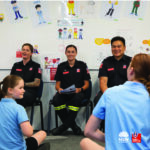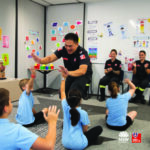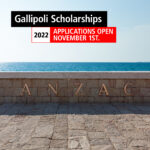Catholic Bishops endorse Uluru Statement from the Heart (Ref: 337/21)
Australia’s Catholic bishops, on the recommendation of their key Aboriginal and Torres Strait Islander advisers, have endorsed the Uluru Statement from the Heart. The Australian Catholic Bishops Conference made the decision as it gathered online for its biannual meeting earlier this month. The bishops’ consideration of the matter was informed by the words of St John Paul II, who in a visit to Alice Springs in 1986 said to Aboriginal and Torres Strait Islander peoples: “Your culture, which shows the lasting genius and dignity of your race, must not be allowed to disappear… Your songs, your stories, your paintings, your dances, your languages, must never be lost.” Bishop Columba Macbeth-Green OSPPE, chair of the Bishops Commission for Relations with Aboriginal and Torres Strait Islander Peoples, said the Bishops Conference had been awaiting guidance on the Statement from the Heart.
211122 – ACBC – Catholic bishops endorse Uluru Statement from the Heart
NESA amendments to Non-Government Schools Manuals (Ref: 338/21)
NESA has amended the non-government school registration manuals to reduce compliance and administrative burden on schools and teachers.
The manuals are available for download from the following links:
- Registration Systems and Member Non-government Schools (NSW) Manual
- Registered and Accredited Individual Non-government Schools (NSW) Manual
You can also find versions of the manuals with tracked changes on the NESA Supporting School Compliance page here.
To ensure schools and teachers can take advantage of the amendments as soon as possible, the new manuals will take effect on 1 January 2022.
The Australian Education Research Organisation Newsletter (Ref: 344/21)
The Australian Education Research Organisation (AERO) was created to bring high-quality research evidence to education practitioners and policymakers and to foster its effective use, so that children and young people can achieve the best possible outcomes. AERO is seeking to actively engage with the education community as they prioritise work in areas most relevant to their needs.
Access AERO’s latest publications: HERE
Scroll to the bottom of the hyperlinked page to subscribe and stay up to date with the latest AERO research & news.
For further information contact Gary Molloy: [email protected]
HSC Results Analysis – 2022 Training Dates (Ref: 332/21)
Diocesan Officers’ Overview – 2 March 2022
Target group: Diocesan & RI/MPJP System Level Officers. A walk-through of how you use the system-level reports in conjunction with school reports to support schools, including opportunities for cross-system sharing and key features of the 2021 HSC.
Introduction to the Analysis – 4 March 2022 or 23 March 2022
Target group: Teachers, KLA coordinators and others who have not previously attended an HSC seminar, and for those who have but who want to ‘brush up’ on the main ideas behind the Analysis. It’s very handy if two or more people from the same school can enrol for the same seminar.
A Detailed Reading of your Analysis – 8 March 2022 or 25 March 2022
Target group: Experienced users – any teacher, coordinator, AP or Principal who has previously attended at least one HSC Analysis Seminar. Applicants will be asked to nominate the year in which they satisfied the prerequisite. Alternately complete the Introduction session this year before attending the Detailed Read.
Leading your School in the Analysis – 21 March 2022
Target group: Principals, APs, Leaders of Curriculum or Pedagogy, Those who have a whole-school focus rather than a one-KLA or year group. If you are the person within the school to whom the principal delegates the overview of the HSC Analysis, this is the seminar for you. If you are newly appointed into such a role, you need to be at this seminar.
The above dates are based on current NESA advice in relation to the release of HSC results. Links to enrol in these courses will be available in next week’s Scholaris
Director Identification Number for charities and not-for-profits (Ref: 339/21)
The Treasury Laws Amendment (Registries Modernisation and other measures) Act 2020 was enacted on 12 June 2020. Its primary purpose is to prevent illegal phoenixing of companies, penalise directors’ involvement in illegal phoenixing and promote and improve the integrity of corporate data.
It will allow regulators and advisors to obtain a more complete picture of a director’s corporate history and every company of which that director has been a part. Further, it will give a clearer view of whether companies have participated in related party transactions, and whether directors have had conflicts of interest.
The scheme is also meant to protect the privacy of directors by allowing them to be identified on public registers without disclosing, dates of birth, full names and residential addresses, etc.
For further information please read the full document below:
Director Identification Number for charities and not-for-profits
New Template to assist with Record Retention and Disposal (Ref: 340/21)
Catholic Schools New South Wales has developed a template to assist non-government schools with determining their record retention and disposal obligations.
The template seeks to provide schools with a comprehensive outline of the type of documents schools may possess, noting their corresponding retention and disposal time periods. It is important to note that the template is a guide only and schools should adapt it to suit the needs of their individual circumstances.
The template can be accessed and downloaded below:
For further information contact the Catholic Schools New South Wales legal team: [email protected]
10 Child Safe Standards – update on new legislation (Ref: 325/11)
As outlined in the 29 June 2021 issue of Scholaris, the Children’s Guardian Amendment (Child Safe Scheme) Bill 2021 (NSW) (the Bill) passed the NSW Legislative Assembly. By way of update, the Bill has now been passed by both Houses of NSW Parliament, and the new law will commence after assent and on the proclamation date (anticipated to be before the end of 2021).
As previously outlined, the new law enshrines the 10 Child Safe Standards, as recommended by the Royal Commission into Institutional Responses into Child Sexual Abuse. The law also provides a framework for organisations to create and maintain child-safe environments that will be overseen by the NSW Office of the Children’s Guardian (OCG). This framework provides the OCG with four key roles:
- Capability building and support
- Monitoring powers
- Investigative powers
- Enforcement powers
It is important for schools to review their 10 Child Safe Standards implementation framework and workplan to ensure compliance with this legislation. The OCG has resources available on their website to assist and under their key power of Capability building and support, are there to help organisations towards achieving child-safe environments.
Click here to read the Minister for Families, Communities and Disability Services media release.
Civil Liability Amendment (Child Abuse) Bill 2021 – update on new legislation (Ref 326/11)
On 9 November 2021, the Civil Liability Amendment (Child Abuse) Bill 2021 (the Bill) passed both Houses of NSW Parliament. The Bill is currently awaiting assent upon which it will become law in NSW (anticipated to be before the end of November 2021). The Bill seeks to ‘enable courts to set aside certain agreements that settled claims for child abuse where it is just and reasonable to do so and to ensure that Part 2A of [the Civil Liability Act 2002] does not restrict awards of damages for child abuse’.
This reform has been made as part of the legislative response to the Royal Commission into Institutional Responses into Child Sexual Abuse, which found that many survivors of sexual abuse had entered into settlement agreements that survivors felt were inadequate due to ‘legal technicalities’ that they had faced, or because they had felt forced into accepting particular settlements, particularly in light of the power imbalances between a survivor and institution.
More information about the new law can be found here.
For further clarification or help, you can also contact the Catholic Schools NSW Legal Hotline on 1800 4Catholic Schools New South Wales (1800 427 679).
Fire and Rescue NSW Educator Resources (Ref: 341/21)
An evidence-based fire safety education program developed by Fire and Rescue NSW has been recognised for its crucial role in empowering children to stay safe and avoid fire risks from an early age. Winner of a 2021 Resilience NSW Award, the program provides teachers with classroom-based learning, supported by local-level partnerships with firefighters, to reduce the risk of fire to children aged between 3 and 10 years.
Children are one of the most at-risk groups when it comes to the risk of fire, with FRNSW responding to over 8,000 fires caused by children and 12 child fire fatalities in the last five years. Prevention through fire safety education is the first line of defence against misuse of fire, and the single most modifiable strategy that fire services can implement to reduce the risk of fire to children.
The free curriculum-mapped programs are designed to:
- improve children’s fire safety knowledge and skills,
- facilitate the transfer of knowledge and skill into children’s families, households, and communities,
- reduce the risk children will play with fire or be harmed by fire, and
- enhance children’s recognition of, and trust in, firefighters.
Social stories, flashcards, visual schedules, and Auslan videos are also available to support students with diverse learning needs.
Fire and Rescue NSW are calling on educators to implement fire safety education in their classrooms in 2022. Further information can be accessed in the Professional Learning Portal here [add link], at brigadekids.com, or by contacting your local fire station.
08112021 FRNSW Fire Education Flyer (Professional Learning)
08112021 FRNSW Fire Education Educators Guide (Professional Learning)


Digital Cultural Adventures (Ref: 342/21)
The DCA workshops support the Australian Curriculum, F-10 educational objectives and outcomes, particularly, in Humanities and Social Science – History (Years F-7), Intercultural Understanding, and the Cross Curriculum Priority – Asia and Australia’s Engagement with Asia. Each workshop involves a live presentation supported by interactive and multimodal learning experiences for students.
Teachers can select from the following DCA programs. I have attached further information about each program:
- Awakening the Dragon (Years F-4)– cultural stories (myths/legends), traditions, cultural symbolism
- The Promise of Gold (Years 4-6)– Chinese migration to Australia prior to, and during the Gold Rushes eras, the establishment of a Chinese community in Australia
- Ancient China and Amazing inventions (Years 6-7) – How historians and archaeologists investigate history including archaeological and written sources, the significant beliefs, values and practices of past Chinese societies.
- Wing Chun Kung Fu (Years F-6) – Students participate in a real-time training session, practicing basic Kung Fu movements to develop strength, balance and mindfulness. The session ishosted by an experienced instructor and students learn about its origins and health benefits.
Link to the DCA programs: https://www.chinesemuseum.com.au/Pages/Category/digital-cultural-adventures-other-states
Supporting young people's experience of the pandemic (Ref: 343/21)
Good Grief has launched a free resource for Year 6 to 12. The resources are designed to support students dealing with the big changes that have occurred in response to COVID-19.
https://www.mackillopinstitute.org.au/resources/seasons-toolkit/
Rural Bank Scholarship Program opens for 2022 - Encouraging the best young minds in agribusiness (Ref: 331/21)
Rural Bank has opened its scholarship applications for students commencing studies in 2022.
The 2022 Rural Bank Scholarship Program will support first-time tertiary students to foster excellence in agriculture and encourage the best young minds in agribusiness to pursue further education and development in the sector.
First-time undergraduate university, agricultural college and TAFE students enrolled in agribusiness studies and with a passion to contribute to the future of Australian agriculture are invited to apply. Each of the eleven scholarships on offer is valued at $5,000 per year and, subject to academic performance and duration of the course, is extended for a second year of study to support students’ study-related expenses, including accommodation costs, course materials and education related travel.
Applications open 1 December 2021 and close 18 February 2022
To find out more about Rural Bank’s agribusiness scholarships visit: https://www.ruralbank.com.au/community/scholarship/
Introduction of Anapen® into NSW Schools – NSWAEP Recommendations (Ref: 333/21)
The NSW Anaphylaxis Education Program has released information regarding Anapen® is a single use adrenaline (epinephrine) injector for the treatment of severe allergic reactions.
The document is below.
Introduction of Anapen NSWAEP recommendations for Catholic schools
Ethics Finder Resource for schools (Ref: 329/21)
A helpful resource for teachers to find articles, videos and information on key ethical, philosophical, and social issues.
Gallipoli Scholarship Fund (Ref: 330/21)
Scholarships and Bursaries
- In 2022 the Department of Defence is joining the Scholarship program and will offer three Bursaries each related to one of the Services, Navy, Army and Air Force.
- Lockheed Martin Australia will provide two Bursaries for students undertaking a STEM course of study.
- Calleo Indigenous will provide at least one and probably more Bursaries to young Indigenous students.
- Ernst and Young will provide two bursaries for a student studying a business-related course and will provide an internship and continued support if the student is progressing well.
- Hall Rotary will provide a Bursary to a student studying agriculture or a related topic.
- Merrylands RSL will provide a Bursary for a student studying at a University campus in their area or for someone who comes from their area.
- Fairfield RSL will provide a Bursary.
- The Gallipoli Memorial Club will provide a Bursary.
- Earlwood Bardwell Park RSL will provide a Bursary.
- Private donors will provide a Mustafa Kemal Ataturk Bursary to an Australian student who has an association with Turkey.
- Up to seven Scholarships will be provided as Gallipoli Scholarships and the Bursaries for second and third year students will continue as required.
Application forms are online and can be accessed here: www.gallipolischolarship.com.au
Applications for Gallipoli Scholarships are invited from young Australian or New Zealanders resident in Australia, who are 25 years of age or younger on 1 March 2022, planning on undertaking their first year of a degree or diploma course (the latter at an advanced diploma at an Australian University or TAFE, commencing in 2022.
They must be direct descendants of an Australian or New Zealand service man or woman who has served in any conflict or peacekeeping operation since the First World War.
As this Scholarship is aimed at young men and women who are “doing it tough” they must be able to demonstrate circumstances that exist that would prevent their attendance at University if they were not to receive a Scholarship. Receipt of a government benefit such as Youth Allowance, ABSTUDY or a similar government benefit is regarded as indicative of financial need.
Applications open on 1 November 2021 and must be received by close of business on 28 February 2022.


